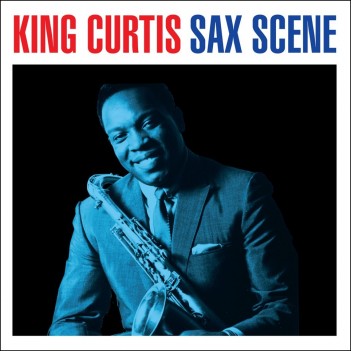Košík
Váš košík je momentálne prázdny.
King Curtis: Sax Scene
10,00 €
Formát:
CD
Dostupnosť:
dodacia doba 7-28 dní
Katalógové číslo:
NOT2CD510
EAN kód:
5060143495106
Autori:
KING CURTIS
Interpreti:
KING CURTIS
Vydavateľ:
NOT NOW
Zoznam skladieb
CD 11. Da Du Dah
2. Have You Heard?
3. Willow Weep For Me
4. Little Brother Soul
5. In A Funky Groove
Personnel:
King Curtis - Tenor Saxophone, Trumpet
Nat Adderley - Trumpet,Cornet
Wynton Kelly -Piano
Paul Chambers -Bass
Oliver Jackson -Drums
CD 2
1. Soul Meeting
2. Lazy Soul
3. All The Way
4. Jeep's Blues
5. What Is This Thing Called Love
6. Do You Have Soul Now?
Personnel:
King Curtis - Tenor Saxophone, Trumpet
Nat Adderley - Trumpet,Cornet
Wynton Kelly -Piano
Sam Jones -Bass
Paul Chambers -Bass
Belton Evans -Drums
Oliver Jackson -Drums
Popis
The worlds of jazz, soul and blues met in King Curtis, perhaps the most celebrated tenor saxophonist of his era. Born Curtis Ousley in Texas in 1934, he moved to New York City in the mid Fifties and worked with some of the world’s most famous acts. He was inducted into the Rock and Roll Hall of Fame in 2000, but contributed his genius to many genres.
Sadly, New York was also where his life and career ended in violent fashion in 1971. But the three years from 1955, when he made his Big Apple recording debut on a session for singer-songwriter Jesse Stone, saw him take the fast track to the top and became the leading man on his instrument, supplanting previous session king Sam ‘The Man’ Taylor.
The year of 1958 saw King Curtis feature on a shoal of notable records, including the Coasters’ ‘Yakety Yak’, Bobby Darin’s ‘Splish Splash’ and Clyde McPhatter’s ‘A Lover’s Question’. This trio of hits were all for Atlantic Records, but so sought-after was Curtis that he remained a freelance horn for hire, and made a good living.
He had been raised in Mansfield, a small town outside Fort Worth; his father played guitar in a local church. He too learned guitar, but took up the alto sax as his main instrument in his mid teens in emulation of jump-jive pioneer Louis Jordan. Fellow horn-man Ornette Coleman was an older schoolmate. Blues stars visiting the area regularly hired the precocious youngster, and he continued his education by touring with Lionel Hampton’s orchestra. He then briefly led a trio featuring Horace Silver on piano before moving to New York and entering the studio session world.
Curtis’s concentration on commercial R&B was for financial reasons; as he explained to music historian Charlie Gillett, ‘I love the authentic rhythm and blues more than anything…and I also like to live well.’ The two albums reissued here were both released in 1960 when Curtis was looking to pursue a parallel career as a jazz bandleader. ‘The New Scene Of King Curtis’ appeared on New Jazz Records, a subsidiary of Prestige Records, while the subsequent ‘Soul Meeting’ was released on Prestige itself.
The five tracks comprising ‘New Scene…’ were cut in a single April day in Rudy Van Gelder’s celebrated studio in New Jersey where so many Prestige classics took shape. This was instrumental music described by one critic as ‘bluesy R&B riffs over a hard-bop setting, as infectious as it is mellow.’ Material was all penned by Curtis with the exception of Ann Ronell’s ‘Willow Weep For Me’, a song that had already become the Broadway composer’s greatest success.
The band’s chemistry was apparent, with Curtis combining effectively with the experienced Nat Adderley on trumpet. Wynton Kelly and Paul Chambers on keyboards and bass respectively created the responsive partnership that featured on albums by John Coltrane and Wes Montgomery, with Ollie Jackson contributing drums.
‘Soul Meeting’ took shape just five months after its predecessor; left-over material recorded on the April session was augmented by new cuts featuring Sam Jones and Belton Evans on bass and drums respectively. The core of Curtis, Adderley and Kelly remained unchanged.
All five cuts on ‘Soul Meeting’ range from between five and just over seven minutes, the material mixing covers of standards from the pens of Duke Ellington (‘Jeep’s Blues’) and Sammy Cahn (‘All The Way’) with originals by the leader that inevitably contained the word ‘soul’ in their title.
Two years after these recordings, Curtis made the US Top Forty with the first of three big instrumental hits. As well as making Number 17 pop and topping the R&B chart, ‘Soul Twist’ had the honour of being referred to by Sam Cooke in his 1962 recording ‘Having A Party’. Curtis registered 15 titles in the Hot 100 from 1962 to 1971, most notably 1967’s ‘Memphis Soul Stew’, and in 1970 won the Best R&B Instrumental Performance Grammy for ‘Games People Play’. Just as notably, he worked with such famous names as Donny Hathaway, Roberta Flack, Ben E King, John Lennon (one of his last sessions was on the ‘Imagine’ album) and Eric Clapton.
The music world lost one of its top musicians when King Curtis was murdered by a drug addict on the steps of his Manhattan brownstone. But his talents live on, both in contributions to others’ and his own work, as showcased here.
Aretha Franklin (whose musical director he was) sang and Stevie Wonder played at his funeral, while Duane Allman of the Allman Brothers Band, who worked with Curtis under producer Jerry Wexler, paid this emotional tribute to his colleague from the stage of New York’s Fillmore East: ‘That was one of the finest cats there ever was… Boy, it’s incredible, it’s unbelievable, the power and the emotional stature the man had. He’s an incredible human being.’
Amen to that…
Prihlásenie
Newsletter



